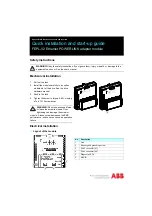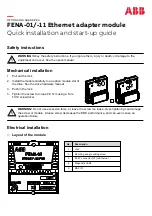
IFU EN T800, Rev 09/2016-07-07, art.no. 8004007
16
4 Alarm
The device is designed to test and supervise itself during the start up process to alert the operator
of any faults or errors which might cause problems during the use of this product.
The start-up tests are performed every time the unit is activated to review the status of both the
software and hardware of this microprocessor controlled device. If these tests detect any errors,
the appropriate message will be shown in the display. The possible errors are listed below.
4.1
Alarm system
When something occurs in the system that must come to the operator´s attention, a message is
clearly displayed on the screen and an audio alarm is emitted. This is referred to as “Raising an
Alarm”. If one of the cuffs is the cause to the alarm will also a red or a yellow framework indicate
which cuff it is and which priority the alarm has.
The alarms consist of the following categories:
Priority
Signal color
Signal sound
High
Red
10 beeps repeated every 10 second,
Medium
Yellow
3 beeps repeated every 20 seconds
Low
Yellow
1 beep
Note: All alarms have the same sound level.
4.2
The automatic alarm safety mechanism
When a high or medium priority alarm (and even some low priority alarm) occurs, an automatic
safety mechanism closes all the valves and turns off the pump.
To exit from this state the operator has three (3) options:
1.
Perform a self test (ref. 3.1.3). This self test will not open the block valve (i.e. the
pressure in cuffs is unaffected), but it performs a test that the internal components of the
tourniquet are operating safely. It is not possible to inflate or increase the pressure during
this state.
2.
Acknowledge the alarm by pressing the “Alarm” icon.
3.
The cause of the alarm is corrected.
4.3
Alarm priority
If a higher priority alarms occurs after a lower priority alarm, the higher priority alarm is
prioritized and displayed. Lower priority alarms that occur after a higher priority alarm are
queued but not displayed until the higher priority alarm is acknowledged by the operator.
4.4
Alarm reset
By pressing the “Alarm” icon you acknowledge, silence and reset the displayed alarm condition
signal only. Other alarm conditions are unaffected. If more than one alarm condition exists, the
operator has to reset each alarm separately. Some alarm conditions, e.g. AC power failure, resets
automatically when the cause, that was generating the alarm signal, ceases.









































